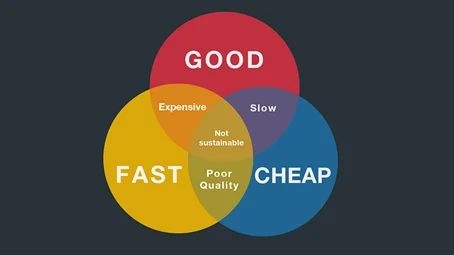Although we are only halfway through the year, we can already say with certainty that 2023 belongs to artificial intelligence. AI (Artificial Intelligence) is firing up the imagination of people all over the world because it is no longer just a curiosity, but a fully-fledged tool that produces real, impressive results and is being used for increasingly serious tasks.
The AI revolution has also reached the translation industry. The very concept of using machine-assisted translation is not new, but the artificial intelligence tools currently in place allow such reliable results that it seems natural to ask whether we still need traditional translators at all.

Source: https://medium.com/swlh/good-fast-or-cheap-pick-2-to-grow-your-business-7b37bf928a1
AI-produced translations and language
There is no denying that artificial intelligence, e.g., in the form of chatbots from the Open AI organisation, is doing an excellent job of translating usable texts. However, it should be noted that a considerable proportion of translations involve working with specialised texts, where not only knowledge of the language, but also subject-matter expertise in the relevant field, is crucial. Traditional translators are often people who specialise in specific subjects, such as medicine, law, or telecommunications. As a result, such a translator has no problem deciphering medical abbreviations and knows that the words 'contract' and 'agreement' are not always synonyms. Specialised texts are also rife with jargon terms and mental shortcuts, the deciphering of which requires knowledge, experience, and sometimes consulting other experts. Despite advances in technology, nuance, ambiguity, and any linguistic pitfalls are still a problem for machine translation.
Collaborating with a human also enables fast, precise, and flexible communication. With the translator, we can establish the preferred terminology for our text, and it is the translator who knows that in patent descriptions 'method' translates into Polish as 'sposób', and not as 'metoda'. Finally, it is the translator who will ensure consistency as well as factual and linguistic correctness. It is common that a text to be translated contains typos, minor errors or misapplied punctuation and grammatical rules. It is therefore crucial to first decipher the author's intentions, which are not always obvious. AI is a great support tool, but it uses the language it deems best, not the language that is most appropriate in a given context. With the help of a traditional, trusted translator, we get a complete, finished document that we can use straight away without fear.
Fast and free - is it really?
The main advantage of AI translations is their incredible speed, which equals time and money savings. In many cases, however, these savings can be illusory. If we want our texts to be of high quality, it is necessary to use an AI translation reviewer. Analysing a translation is a tedious and lengthy process in which there are no shortcuts. Naturally, it is possible to use AI translations without having them checked by a human and this is often practised. However, it is important to consider whether submitting, for example, a patent description translated without a translator will not expose us to greater costs in the long run. This includes the narrowed scope of the invention and the time and money spent on asserting one's rights or republication of the patent.
The most popular AI tools, such as ChatGPT, are free and easily accessible. However, many such services require a login, and the use of free solutions means that we are providing data over which we have no control. These may be used against our will (e.g., sold), and the tool itself may require payment after some time. Our intellectual property and data represent an enterprise value, so it is worth considering whether we really want to make our resources, often the result of years of work and knowledge, so widely available.
AI and security issues
The model of how AI works is complex, and the technology itself does not allow for easy outside interference and deletion of the information provided. When using AI, we do not sign a contract and are not guaranteed confidentiality, nor do we know what happens to the text we have shared. We have no guarantee that our data is properly protected, that it is not permanently recorded and analysed in the wrong way, and it can be exceedingly difficult to assert rights in the event of violations. This is particularly important when we commission a lot of translations, they contain sensitive data and, in broad terms, can present the whole picture of our company to third parties.
With traditional translations, the security issue is completely different-we have the option to sign a contract and any breaches can be investigated by the relevant authorities. AI is also no substitute for a sworn translator that is obliged to maintain confidentiality and translate carefully. This is especially important in the context of translations of confidential documents or those that constitute key evidence in court. Moreover, AI does not accept any liability for errors or failure to exercise due diligence, and the legislation does not address issues concerning AI. For this reason, it can be difficult or even impossible to assert our rights in the event of a breach of our copyright or accidental disclosure of an invention. Involving an interpreter is therefore also a way of ensuring that we have an adequate defence in the event of any problems.
Summary
AI is certainly a revolutionary tool that should be closely observed. There are often extreme assessments in the media, ranging from cheerful optimism to deep reluctance. It is worth taking advantage of the benefits of innovative technologies but remember that translation is a complex process and will require investment in the services of a traditional translator for a long time to come.
The content of this article is intended to provide a general guide to the subject matter. Specialist advice should be sought about your specific circumstances.

